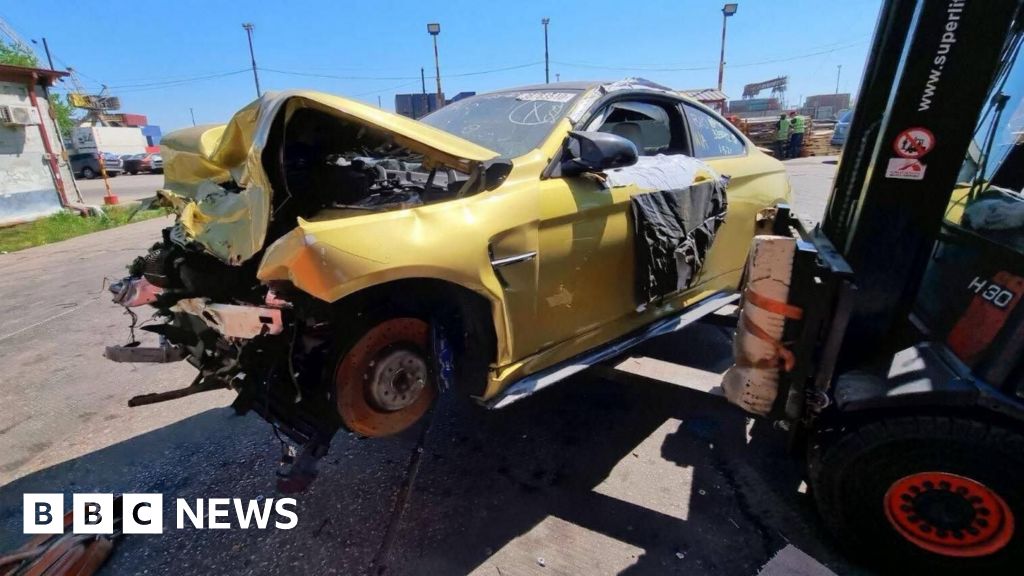The small South Caucasus country of Georgia has grown into a multi-billion dollar hub on the international used vehicle market. The majority of the vehicles are sourced from US and many seem to end up in Russia.
A vast area of open air carparks is located on the dusty outskirts Rustavi. This industrial town is 20km (12 miles), southeast of Georgia’s capital Tbilisi.
It is the size of 40 football fields and hosts thousands of vehicles for sale.
You can find any car you desire – Mercedes, Porsches Jaguars, Toyotas, and more recently Teslas. All of them are here.
Caucasus Auto Import, a company which buys used vehicles from US auctions, owns one of the largest carparks. These vehicles are often so badly damaged by accidents that they were written off by American insurance companies.
CAI claims that its “team” of experts in the States will personally pick up the cars and then arrange for their export via container ship, 10,000km (6,500 miles) to a Georgian port on the Black Sea coast. The cars will be repaired by Georgian mechanics.
David Gulashvili is the deputy chief executive of CAI. He says, “Our company has made a significant contribution to the renewal of Georgia’s fleet of cars.” “When we began our business in 2004, the Georgian automotive infrastructure was entirely Soviet-produced, including [Soviet brand] Lada or Vaz.
He claims that his company has responded “to a lot of demand for Western produced vehicles”. The firm currently has 600 employees.
According to official statistics, Georgia imported cars worth $3.1bn (PS2.4bn). The country then exported vehicles worth $2.1bn to former Soviet republics, mainly in the Caucasus region and Central Asia. In fact, cars are Georgia’s second largest export in terms of value after copper ore.
Customers are always on the lookout for the best deal in Rustavi’s huge car market. Each car has an inside windscreen card that indicates the price, engine size and date of production.
Alisher Tezikbayev is from Kazakhstan. He and his friends are exploring Toyota’s section.
“We have been re-exporting Georgian cars for around 3.5 years.” We send cars to Kazakhstan, and we organise auto trips, when clients visit Georgia to choose their own car,” says Tezikbayev who posts videos to his 100k Tik Tok followers.
Georgia used to export used US and European vehicles to its northern neighbor Russia, with which it shares a common border. This has now officially ceased as a result the Russian invasion of Ukraine 2022.
In September 2023 the Georgian Revenue Service announced, in accordance with the latest Western sanctions at the time against Russia, that it would restrict the re-exporting and transit of imported automobiles from the US and Europe to Russia and Belarus.
Georgian officials have denied for years that their country was complicit in helping Russia to evade the trade embargoes.
A recent investigation by the Georgian media publication Ifacti revealed that car dealers from both sides of Russia-Georgian borders exploited numerous loopholes.
David Gulashvili has stated that his company does not do any business with Russia. “Since the first day of the war, we have restricted all transactions from Russia and any exports to Russia. You will not find a single vehicle exported to Russia by Caucasus Auto Import.”
He adds, however, that there is currently no mechanism in place to monitor the final destination of re-exported vehicles going to other countries.
Since the Russian invasion of Ukraine, exports of used vehicles to Kazakhstan Kyrgyzstan Armenia have risen dramatically. All three countries are members of Russia’s customs union.
This means that a car registered in one of these countries can be driven into Russia with minimal tariffs.
Georgia’s national statistical agency has released figures that indicate cars are in fact being shipped to Russia. According to the report, Georgia exported 7,352 cars in 2022, but in 2023, that number increased by more than five times.
The geography of Georgia can explain the success of its second-hand auto industry, despite the geopolitical turmoil. It has access to Europe through its Black Sea ports and to Central Asia through Baku on the Caspian coast of neighbouring Azerbaijan.
The cost of labour is another important factor when it comes to repairing salvaged cars.
Mr Gulashvili says that it is not always economical to rebuild cars in the US.
“This is due to the high cost of human resources and service costs. The legal costs for getting those cars back on road is a time-consuming and expensive process.
“In the US, rebuilding a car and making it legal takes six months, and let’s say, $5,000. In Georgia, it takes $1,000 and a month to fix the same vehicle.”
Zaza Andreashvili, in a vast warehouse outside of Tbilisi leans over an engine mounted on a special stand. The mechanic points at the cylinders that he just cleaned.
“The engine is at the heart of a vehicle. If your heart stops working, you will die. “The same is true for cars. If the engine stops working, they die.”
Mr Andreashvili is a car engine repairer who has been in the business for over 30 years. “We used books to learn, there was no Internet at the time,” says Andreashvili.
There is a loud banging sound next to Mr Andreashvili’s workshop. Roma and Boris, his apprentice, are experts in bodywork repairs.
Boris uses a panel-beater to reshape the near side wing on a mangled car. Roma, wearing a brown tee-shirt with USA on the front, claims to have been repairing automobiles for 50 years.
“Mercedes have the best metal. Volvo and Toyotas also are good, but some cars’ body work is so thin, it’s like paper,” he says.
While most cars imported to Georgia are petrol or diesel-powered, Gulashvili claims that there is a growing demand for electric and hybrid vehicles.
“Right now, we’re bringing about 30% hybrid cars.” It’s not fully electric but it is hybrid like Toyota Prius. The growth rate is out of this world, it’s 300-400% quarter over quarter.”
According to Mr Gulashvili’s staff, he has 100 employees in Ukraine.
“It is very expensive and very risky but we are still trying to get traction in that area.” We also import a lot pickup trucks into Ukraine that are used in the fight against Russia.”
Read More @ www.bbc.com




